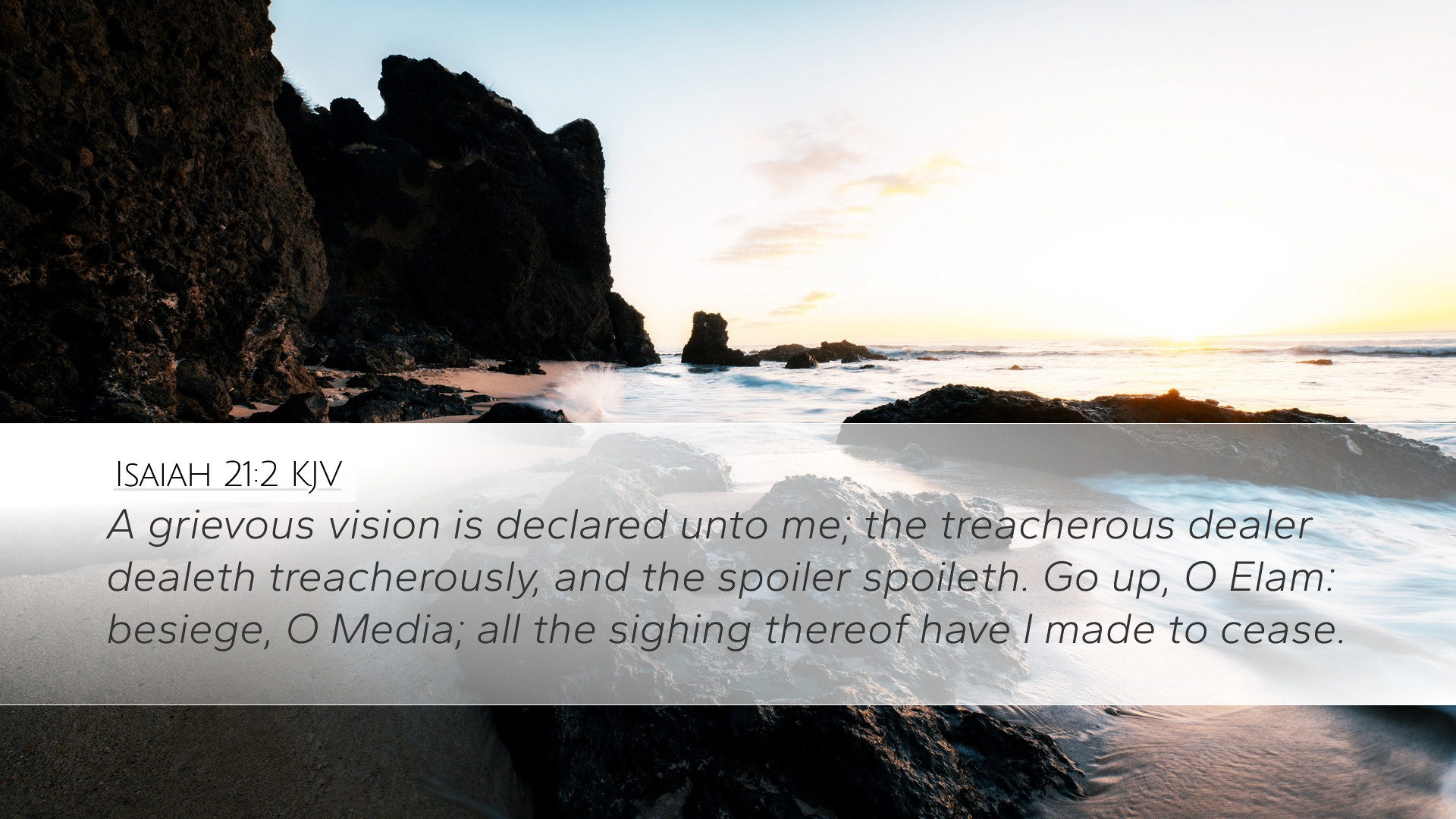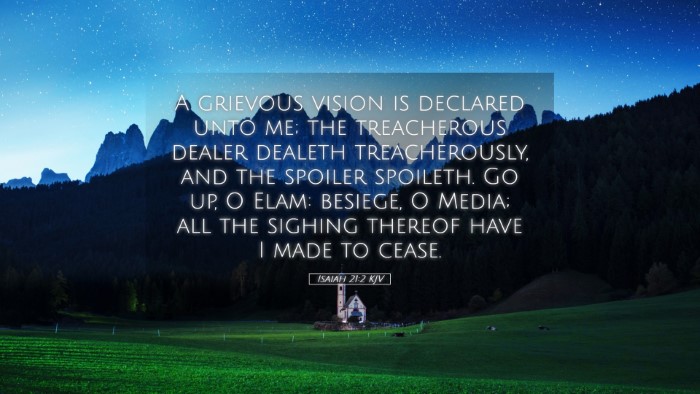Commentary on Isaiah 21:2
Isaiah 21:2 (KJV): "A grievous vision is declared unto me; the treacherous dealer dealeth treacherously, and the spoiler spoileth. Go up, O Elam: besiege, O Media; all the sighing thereof have I made to cease."
Contextual Overview
The book of Isaiah is rich with prophecy and poetic expression. In Isaiah 21, the prophet paints a grim picture of impending judgment on Babylon and the surrounding nations. The passage reflects the depths of divine revelation bestowed upon the prophet concerning future calamities and the tumult among the nations.
Matthew Henry's Insights
According to Matthew Henry, this passage reveals the destructive fate of Babylon, depicted as a "grievous vision." Henry emphasizes that the term "grievous" indicates not only the severity inherent in the prophecy but also the weight of responsibility upon the prophet as a mouthpiece for God's message.
- The Treacherous Dealer: Henry points out that the "treacherous dealer" represents those in power who betray trust for personal gain. This serves as a warning against the nature of human dealings, often characterized by deceit and betrayal.
- The Role of Nations: Elam and Media are mentioned specifically, highlighting the role of foreign powers in God's judgment against Babylon. Henry notes that God orchestrates the rise and fall of nations, often using one to deliver judgment upon another.
- Prophetic Burden: Henry discusses the emotional weight of prophecy, emphasizing Isaiah's role as a prophet who must declare difficult truths. The "sighing" represents the lamentation that precedes divine judgment, reflecting the sorrow of God's people.
Albert Barnes’ Commentary
Albert Barnes provides a detailed examination of the text, particularly focusing on the implications of the prophetic declaration.
- Vision of Judgment: Barnes elaborates that the vision signifies impending doom for Babylon and its leaders. This prophecy is a sober reminder of the consequences of sin and the inevitability of divine judgment.
- Elam and Media: Highlighting the ancient geopolitical context, Barnes asserts that Elam and Media were significant within the historical framework of Babylon's downfall. By commanding them to "besiege," the text foreshadows the instruments of God's wrath.
As Barnes notes, this serves as a pivotal moment in the prophetic narrative, marking a transition from cautionary messages to direct proclamations of coming destruction.
Adam Clarke’s Perspectives
Adam Clarke adds further depth to the interpretation of Isaiah 21:2 by considering the linguistic and historical aspects involved.
- Interpretation of "Grievous Vision": Clarke interprets the "grievous vision" not only as a prophecy of physical destruction but as a spiritual lament over the moral decay of nations. He posits this as indicative of God's sorrow over sin.
- Symbolism of Nations: Clarke emphasizes the symbolic nature of Elam and Media, suggesting they represent not just historical entities but enduring principles of divine justice at work in the world.
- Reflection on God's Sovereignty: Clarke aligns with the sentiments expressed by Henry and Barnes, emphasizing God's ultimate authority in orchestrating the rise and fall of nations, demonstrating that all events unfold according to His divine will.
Clarke’s analysis encourages readers to consider the profound implications of God’s judgments and the call to righteousness that echoes from this scripture.
Theological Reflections
This passage invites deeper theological reflections on the nature of God’s judgment and the human condition.
- The Nature of Prophecy: It raises questions about how prophecy informs our understanding of present realities and future hopes, illustrating the weighty responsibility borne by those called to speak on behalf of God.
- Warning Against Treachery: The characterization of the “treacherous dealer” serves as a timeless admonition. It prompts discernment in leadership and vigilance against corruption within individual hearts and societal structures.
- God’s Sovereignty: Each commentator underscores God’s sovereignty in executing judgment. This remains a crucial aspect of biblical theology, emphasizing that nothing is beyond His control, including the actions of world powers.
Conclusion
The commentary on Isaiah 21:2 from these esteemed public domain resources illuminates the profound layers of meaning embedded within this prophecy. The insights from Matthew Henry, Albert Barnes, and Adam Clarke collectively stress the significance of divine justice and the weight of prophetic authority. Most importantly, they remind us of the ongoing relevance of these themes in our contemporary context, urging pastors, students, and theologians to approach the Scriptures with both humility and urgency.


